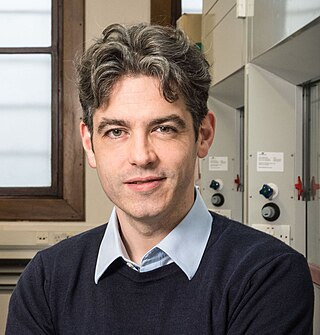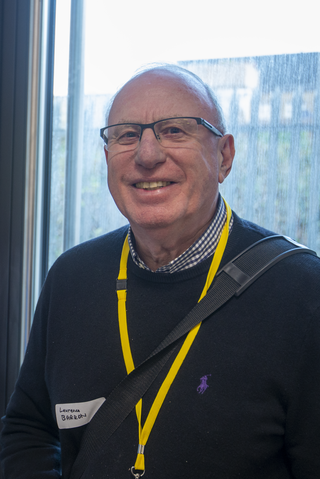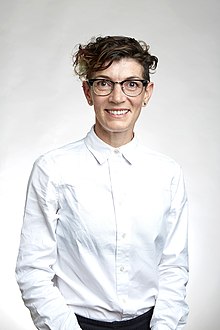
The Royal Society of Chemistry (RSC) is a learned society in the United Kingdom with the goal of "advancing the chemical sciences". It was formed in 1980 from the amalgamation of the Chemical Society, the Royal Institute of Chemistry, the Faraday Society, and the Society for Analytical Chemistry with a new Royal Charter and the dual role of learned society and professional body. At its inception, the Society had a combined membership of 34,000 in the UK and a further 8,000 abroad. The headquarters of the Society are at Burlington House, Piccadilly, London. It also has offices in Thomas Graham House in Cambridge where RSC Publishing is based. The Society has offices in the United States, on the campuses of The University of Pennsylvania and Drexel University, at the University City Science Center in Philadelphia, Pennsylvania, in both Beijing and Shanghai, China and in Bangalore, India.

Leroy "Lee" CroninFRSE FRSC is the Regius Chair of Chemistry in the School of Chemistry at the University of Glasgow. He was elected to the Fellowship of the Royal Society of Edinburgh, the Royal Society of Chemistry, and appointed to the Regius Chair of Chemistry in 2013. He was previously the Gardiner Chair, appointed April 2009.
The School of Chemistry is a school of the University of Edinburgh, in Scotland. In the 2008 Research Assessment Exercise (RAE) the school was ranked sixth in the UK.

David Alan Leigh FRS FRSE FRSC is a British chemist, Royal Society Research Professor and, since 2014, the Sir Samuel Hall Chair of Chemistry in the Department of Chemistry at the University of Manchester. He was previously the Forbes Chair of Organic Chemistry at the University of Edinburgh (2001–2012) and Professor of Synthetic Chemistry at the University of Warwick (1998–2001).
Dame Lynn Faith Gladden is the Shell Professor of Chemical Engineering at the University of Cambridge. She served as Pro-vice-chancellor for research from 2010 to 2016.

Laurence David Barron has been Gardiner Professor of Chemistry at the University of Glasgow since 1998. He is a chemist who has conducted pioneering research into the properties of chiral molecules — defined by Lord Kelvin as those that cannot be superimposed onto their mirror image. By extending this definition of chirality to include moving particles and processes that vary with time, he has made a fundamental theoretical contribution to the field. Chiral molecules such as amino acids, sugars, proteins, and nucleic acids play a central role in the chemistry of life, and many drug molecules are chiral. Laurence’s work on Raman optical activity — a spectroscopic technique capable of determining the three-dimensional structures of chiral molecules, which he predicted, observed, and applied to problems at the forefront of chemistry and structural biology — has led to its development as a powerful analytical tool used in academic and industrial laboratories worldwide. His much-cited book, Molecular Light Scattering and Optical Activity, has contributed to the growing impact of chirality on many areas of modern science.
(Frederick) Geoffrey Nethersole Cloke FRS is a British chemist, and professor at University of Sussex.
Guy Charles Lloyd-Jones FRS FRSE is a British chemist. He is the Forbes Professor of Organic Chemistry at the University of Edinburgh in the United Kingdom. His research is largely concerned with the determination of organometallic reaction mechanisms, especially those of palladium-catalyzed coupling reactions such as Suzuki-Miyaura coupling.
Stephen T. Liddle FRSE FRSC is a British professor of inorganic chemistry at the University of Manchester. He is Head of Inorganic Chemistry and Co-Director of the Centre for Radiochemistry Research at the University of Manchester since 2015.

Sarah Cleaveland is a veterinary surgeon and Professor of Comparative Epidemiology at the University of Glasgow.

John Paul Attfield is a Professor of Materials science in the School of Chemistry at the University of Edinburgh and Director of the Centre for Science at Extreme Conditions (CSEC).

James Henderson Naismith is Professor of Structural Biology at the University of Oxford, former Director of the Research Complex at Harwell and Director of the Rosalind Franklin Institute. He previously served as Bishop Wardlaw Professor of Chemical Biology at the University of St Andrews. He was a member of Council of the Royal Society (2021-2022). He is currently the Vice-Chair of Council of the European X-ray Free Electron Laser and Vice-President (non-clinical) of The Academy of Medical Sciences. It has been announced that he will be the Head of the MPLS division at Oxford in the autumn of 2023.

Sharon Elizabeth Marie Ashbrook is a Professor of Physical Chemistry at the University of St Andrews. Her research is focused on the application of multinuclear solid-state NMR spectroscopy techniques as well as the combination of these techniques with first-principles calculations to investigate structure, order and dynamics of solid state materials.

David Parker is an English chemist and professor at the University of Durham.

Eva Hevia is a Professor of Organometallic Chemistry at the University of Strathclyde, Glasgow and Professor at the Department of Chemistry and Biochemistry, the University of Bern.
Rachel O'Reilly is a British chemist and Professor at the University of Birmingham. She works at the interface of biology and materials, creating polymers that can mimic natural nanomaterials such as viruses and cells. She is a Fellow of the Royal Society of Chemistry and of the Royal Society.
Alastair Ian Scott was a British-American organic chemist who achieved international renown for elucidating the biosynthetic pathway of vitamin B12.
Helen H. Fielding is a Professor of physical chemistry at University College London (UCL). She focuses on ultrafast transient spectroscopy of protein chromophores and molecules. She was the first woman to win the Royal Society of Chemistry (RSC) Harrison-Meldola Memorial Prize (1996) and Marlow Award (2001).
Karen Jane Faulds is a Scottish academic and Professor of Analytical Chemistry at the University of Strathclyde. She develops surface-enhanced Raman spectroscopy (SERS) for bioanalysis, and has won several awards for her research, including the Coblentz Society Craver Award.
Andrew Dawson Taylor was director of the Science and Technology Facilities Council National Laboratories – Rutherford Appleton Laboratory, Daresbury Laboratory, and the UK Astronomy Technology Centre in Edinburgh until his retirement in 2019.

![Structure of C6H6[U(Ntms2)2]2 from Arnold's lab DEHHEF.png](http://upload.wikimedia.org/wikipedia/commons/thumb/4/4b/DEHHEF.png/220px-DEHHEF.png)









